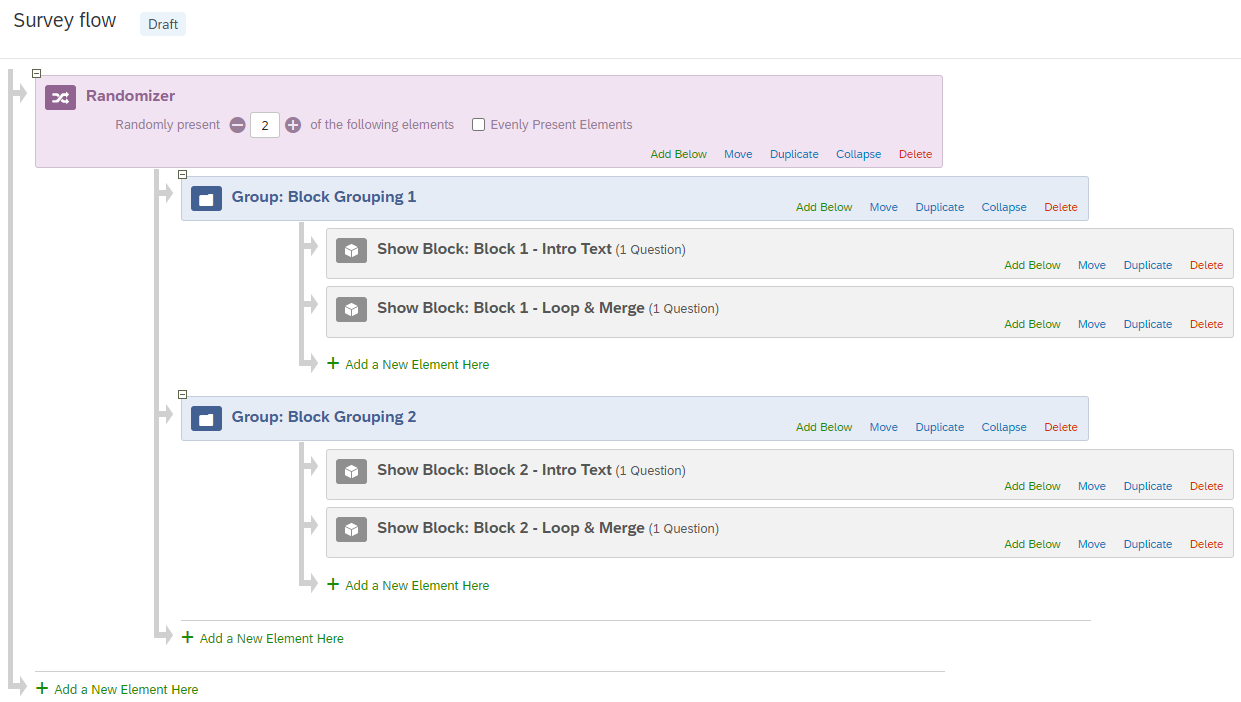In a within-subject study design I am randomizing the order of 2 blocks (control and experimental condition). Technically, each of these blocks contains a single question only — but since each block has a looping logic attached, it produces a lot of different questions.
But the problem is: each block needs to be introduced by its own introduction text, and this text should occur only once, so it can not be part of the looped block. How can I accomplish what I am looking for? If there were a variable that contains the actual randomized order, I could blend in conditionally introduction text #1 or text #2. I such a variable available? I couldn't find one. Or I am thinking too complicated?
Is there a variable that represents the randomization order and can be used as piped text?
Best answer by CamM
Hi novern, I think I have a solution for you 😀
If I'm correctly understanding your requirements, then I believe you can achieve the desired outcome with minimal fuss.
- Add 2 additional blocks into your survey. Place your Block 1/2 intro text into each block (respectively).
- Open up the Survey Flow screen and add in 2 Group elements, nested underneath your Randomizer element. These Groups will essentially represent "Block 1" and "Block 2".
- Within each respective Group element, simply nest the relevant Intro Text block, followed by the relevant Loop & Merge block.
I've added a screenshot below for visual reference in case the above isn't overly clear.
The outcome of this Survey Flow setup is that each Group element is randomly presented to the respondent (as opposed to a specific Loop & Merge block). For each Group, the respondent will first see the relevant Intro Text block (once only), followed by the relevant Loop & Merge block.
Hope that gets the desired outcome for you.
Cheers,
Cameron

Sign up
Already have an account? Login

Welcome! To join the Qualtrics Experience Community, log in with your existing Qualtrics credentials below.
Confirm your username, share a bit about yourself, Once your account has been approved by our admins then you're ready to explore and connect .
Free trial account? No problem. Log in with your trial credentials to join.
No free trial account? No problem! Register here
Already a member? Hi and welcome back! We're glad you're here 🙂
You will see the Qualtrics login page briefly before being taken to the Experience Community
Login with Qualtrics

Welcome! To join the Qualtrics Experience Community, log in with your existing Qualtrics credentials below.
Confirm your username, share a bit about yourself, Once your account has been approved by our admins then you're ready to explore and connect .
Free trial account? No problem. Log in with your trial credentials to join. No free trial account? No problem! Register here
Already a member? Hi and welcome back! We're glad you're here 🙂
You will see the Qualtrics login page briefly before being taken to the Experience Community
Login to the Community

Welcome! To join the Qualtrics Experience Community, log in with your existing Qualtrics credentials below.
Confirm your username, share a bit about yourself, Once your account has been approved by our admins then you're ready to explore and connect .
Free trial account? No problem. Log in with your trial credentials to join.
No free trial account? No problem! Register here
Already a member? Hi and welcome back! We're glad you're here 🙂
You will see the Qualtrics login page briefly before being taken to the Experience Community
Login with Qualtrics

Welcome! To join the Qualtrics Experience Community, log in with your existing Qualtrics credentials below.
Confirm your username, share a bit about yourself, Once your account has been approved by our admins then you're ready to explore and connect .
Free trial account? No problem. Log in with your trial credentials to join. No free trial account? No problem! Register here
Already a member? Hi and welcome back! We're glad you're here 🙂
You will see the Qualtrics login page briefly before being taken to the Experience Community
Enter your E-mail address. We'll send you an e-mail with instructions to reset your password.


